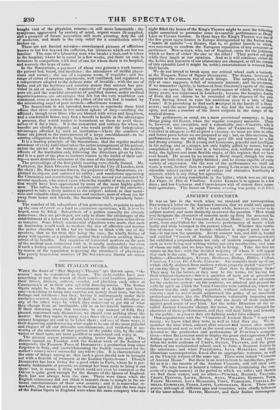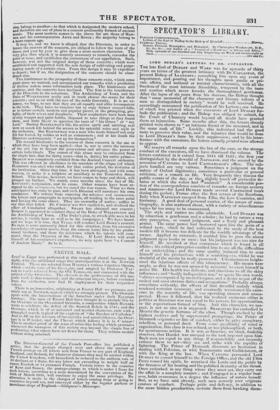ANCIENT CONCERTS.
IT was so late in the week -when we received our correspondent DRUMSTICK'S letter on the Ancient Concerts, that we could only append to it a brief rejoinder. It will be worth while, however, to recur to its
subject matter, and more distinctly to answer the question "How would you designate the character of concerts made up from the annexed list of composers?" " The Concerts of Ancient Music," as their title im- ports, were established for the exclusive performance of music which really and truly belonged to the ancient school. Whether this restric- tion of choice was wise or foolish—whether it argued good taste or bad—is not now the question. Every concert was, and still is, headed and entitled "Concert of' Ancient Music ;" but our correspondent's list exhibited a preponderance not only of modern composers, but of such as were living and writing within our own recollection, and some of Whom are still, and we hope long will be living. Take the first ten names on the list ; with the decided majority of whom it will appear that such is the case. We print the names of our contemporaries in Italics,—A/hrechisberger, Av.:sox, Beethoven, Bishop, Binder, Galleon, Ginutrosa, CLAnt, Dr. Clarke, concerto. Are concerts made up of ma- terials chiefly deduced from modern writers properly styled "«neient?" or can any thing he more "absurd " than thus to designate them? They may be the better, or they may be the worse, for having lost their original character—this is a question of taste not at present sub judice : but ancient they most assuredly are not. We are no advocates for the exclusive system : on the contrary, we admired and praised the catholic spirit on which the l'ocal Concerts were carried on, where ex- cellence was the only quality regarded, without reference to age or country ; and we never could understand the policy of' an associated professional society like the Philharmonic voluntarily imposing upon themselves rules which effectually shut the doors of their orchestra against good music of any kind. ',et the noble Directors of the so- called Ancient Concerts change the name, as they have changed the character of these performances, and they will deal fairly and honestly by the public : at present they are fighting under false colours. Our-acquaintance whim the " Concerts of Ancient Music" is not very recent : we know what they were, as well as what they are. We re- member the time when, concert after concert and season after season, the research and zeal as well as the vocal energy of limermimAx were devoted to the production and performance of Pones:Les composi-
tions—when BILLINCTON used to display the grace and expression of the Italian opera as it was in the days of PORPORA, HAssE, and Viso; when the noble anthems of CROFT, GREEN, TnAvEns, and the great fathers of our ecclesiastical school, used to form a frequent feature In the selections ; and when PALESTRINA, Luc. MARENZIO, and their illustrious contemporaries, found also an appropriate welcome, as well
as the Flemish writers of the same age. These were indeed "Concerts of Ancient Music." But there is no need to trust to recollection, grate- ful as it is ; the records of the Ancient Concerts, will tell their own tale. 'We take down at hazard a volume of these (containing the con-
certs of a single season) at the period to which we refer ; and therein we find these names, and no other,-1.31MICELL, HANDEL, TnAvEas,
CROFT, PEPUSCII, LOCKE, BOYCE, ARNE, WILLBYE, GIBBONS, FORD,
PADRE MARTINI, LUCA MARENZIO, VINCI, PERGOLESI, CORELLI, JO" MELIA, GEMINIANI, PEREZ, LOTTI, LAMPUGNANI, BACH. These com- posers, although of different ages and countries, were chiefly followers of the same school. HAYDN, MOZART, and their Italian contempora• ries, belong to another—to that which is designated the modern school, and therefore are out of place in a concert professedly formed of ancient music. The most modern names in the above list are those of HAN- DEL and his contemporaries ARNE and BOYCE ; the majority belong to a more remote age.
It may be, and we know is alleged, that the Directors, in order to insure the success of the concerts, are obliged to follow the taste of the times, and year by year to give them a more modern character. The very plea thus urged, it is scarcely necessary to remark, concedes the point at issue, and establishes the correctness of our appellation. Such, however, was not the original design of these concerts; which were established and supported with the sole design of cultivating and perpe- tuating music of a certain class. From this design it may be expedient to depart; but if so, the designation of the concerts should be aban- doned also.
Two hindrances to the prosperity of these concerts exist, -which some years since we noticed, and accompanied our remarks with a prediction of decline unless some reformation took place. The hindrances still continue, and the concerts have declined. The first is the interference of the Directors in the selections. The Archbishop of YORK and the Duke of WELLINGTON realty and in truth choose the music for their concerts ; and so on with the rest of the noble fraternity. It is no ca- lumny, we hope, to say that they are all equally and alike incompetent to the task. They have no resource but to copy former concert-bills, or to infuse certain modern and popular pieces, at the prompting, pro- bably, of their wives and daughters. Their conductors have been men of easy temper and quiet habits, disposed to take things as they found I them, and little likely to question the taste of " his Grace" or " my Lord." During Esieri.EalAN's life, his active spirit and untiring zeal were as much felt behind the scenes as his splendid voice and style in the orchestra. But BARTLE:MAN was a man who made himself not only felt but feared, by nobles as well as commoners ; and at his death the Directors unfortunately " set up for themselves."
The second hindrance to the success of these concerts is the use to which they have long been applied—that is, not to serve the interests of the art, but to favour the pretensions and advance the power of certain individuals. The extent of this abuse may be estimated from the single fact, that for thirty years—that is, during his entire prime- Basirssi was completely excluded from the Ancient Concert orchestra.
This was effected in obedience to the mandate of the clique (of which HARRISON was one) who ruled, for that entire period, the destinies of
the institution. Since that time, it has been attempted, and with some
success; to make it a tailpiece or auxiliary to the Tenterden Street School. This device, however, we have reason to hope and think, will
prosper no further. We stated, some months since, the fact of Mr.
KsivvErr's resignation, and its cause. Other reasons have been as- signed in the newspapers, hut we stated the true reason. What we then
anticipated has come to pass, and each Director will nominate his own
conductor. We refrain from exposing the schemes and manoeuvres, the letters and paragraphs in newspapers, all tending to the same point and having the same object. They are unworthy of notice : suffice to
say that they thiled. Dr. Comm was first applied to, and declined the office of Conductor altogether. SMART has obtained one concert ;
Bisnoe is appointed to conduct those of the Duke of' WELLINGTON and the Arebbishep of YORK. (The Duke's plan, to attach able men to his service, is visible here as well as in his campaigns.) We have heard, and we hope it is true, that TURLE will conduct Lord HowE's concert.
No man is more eminently fitted for this situation, from his extensive knowledge of ancient music, from the esteem borne him by his profes- sional brethren, and thom the deference which his talents will com- mand, than the Organist of the rk bbey. If Lord IlowE will avail himself' of his conductor's experience, we may again hear " a Concert of Ancient Music." So be it.



























 Previous page
Previous page